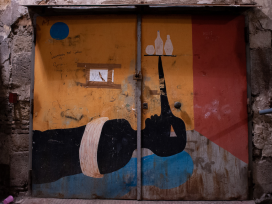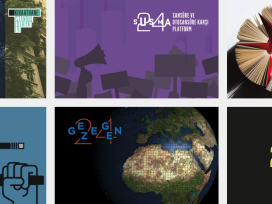Roughly speaking, what percentage of your budget currently comes from sales and what percentage from and advertising? How do you deal with economic difficulties? Are you widening your field of activities beyond strictly publishing? Are you exploring new business models, lobbying cultural decision-makers, or appealing to the public?
Advertising accounts for a small part of the budget. To overcome difficulties we build a more efficient distribution network and draw more on our own resources. We try to increase ad revenue as well. We are not interested in activities other than publishing.
There should be public funding not just for journals, but the publishing industry in general. This would convert the abstract concept of freedom of expression into reality. To demand this is a public right, and the government has a responsibility to support it. This has been done in Turkey before: reduction of paper prices, tax cuts and bulk purchasing could be effective methods. We could look at the neighbouring Arab countries with respect to these kinds of support, not just Europe.
What is your distribution and sales strategy? How do you take your journal to its readers?
We work with distributors and also sell to bookstores directly.
Journals tend to extend their publication intervals due to economic difficulties. How does this impact a journal’s communication with its readers?
This is a bimonthly magazine. As far as the journal publishing conventions in Turkey are concerned, this is a rare and not too successful frequency. Quarterly or biannual journals seem to be the norm, and they mostly publish academic papers. We can see by the works submitted and feedback given by readers that we have managed to establish a connection with them, although this is not a point we consider satisfactory yet.
Do you have a website? How much of your content do you make accessible on it and what other uses does it serve? How do you make use of social media and what do you perceive to be its benefits?
We have a website but we post only parts of the content. We plan to keep a repository of old issues online. We have a twitter account which we update with journal content and our position in some current issues.
Are you experiencing opportunities for synergy or co-operation between big and small media, or print and digital media, that previously did not exist?
The emergence of digital media has been such a rapid process that its dynamics and area of development can not be gauged in countries such as ours. It is not easy for us to make accurate predictions, but it is obvious that digital media expanded the borders of publishing. It is effective in terms of speed and outreach, but its impact on the quality of work is a hot issue for debate.
How do changing readership habits brought on by digitization and Internet media effect circulation and sales? Is digitization bringing a change in the type of text that is submitted to your journal? Do you plan to adapt the journal’s content to changing readership preferences?
We haven’t observed anything significant considering our journal, but it is pretty obvious that the expansion of digital media will influence reading and writing. Texts produced more quickly, shorter sentences point to the fact that shortcuts are reverted to not only in writing but in thinking as well. As the time between thought and expression is shortened, many original thoughts can find expression, but at the same time, an abundance of overly similar thoughts could clutter a very wide domain.
Financing European cultural journals
Like other types of cultural organization reliant on public funds, cultural journals throughout Europe have felt the impact of recession. In addition to funding cuts, journals are also having to negotiate the upheavals taking place in the print sector.
Through a European survey of financing for cultural journals, Eurozine takes stock of the situation of the network, in order to communicate its experiences internally and to others who hold a stake in European cultural policy today. [more]
Read the statements here:
Varlik, Turkey
Ord&Bild and Glänta, Sweden
Vikerkaar, Estonia
Wespennest, Austria
Sodobnost, Slovenia
Host, Czech Republic
Res Publica Nowa, Poland
Mute, UK
Intellectum, Greece
Blätter für deutsche und internationale Politik, Germany
Are there political or literary polarizations between journals? If any, what should be the nature of contest between journals?
Journals are in themselves the products of literary and political polarizations. The fact that polarities exist tell us that all history is the history of class struggle. Journals are more active elements of such polarizations, and “acrimony” is mostly expected of them. When Duvar appeared, it was dubbed the journal for people dissatisfied with the world. As long as dissatisfaction continues, so will our struggle.
Do you think journals continue to be a school for aspiring writers and poets? In the past, writers and poets would usually publish their books after gaining acceptance by having their works published in journals; journals were stepping stones for young writers and poets, and would introduce important foreign writers to their readers before their books were translated. Has this situation changed? What is your opinion of writers who publish books after gaining popularity online?
We believe that journals do have a purpose for aspiring writers, but we’re not sure if they should be called a school. Many young poets who don’t have books have their poems printed in journals since they are more agile in this area. We can also translate the works of poets we admire into Turkish so that they would have a voice here too. Duvar, with this perspective, draws attention to good Arabic poets and writers like Muhammed El Maghut, Zekeriyya Tamer, Gassan Kanafani and Sadi Yusuf.
What responsibility does the bias and cultural inadequacy of mainstream media (daily newspapers and others) bring on journals? Are journals able to stand up to the task? What responsibilities do readers expect journals to undertake?
Mainstream media always masks more than it reveals. This is its raison d’être. As monopolies thrive, we can’t expect it to behave any differently. Serge Halimi says that we could make observations solely on how journalists’ residential locations and salaries have changed in the last thirty years. Journals are not complementary elements of the mainstream media; to the contrary, they must be positioned opposite mainstream media and support any initiative to drill a hole in it. Journals must show readers that it is bad for their health to ignore all sorts of small injustices they come across on a daily basis. These petty compromises do nothing but impoverish the soul.






